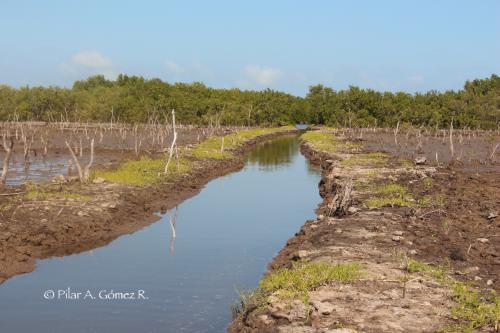Diana Marcela Carrillo Ruiz
In this project we pretend to evaluate the effectiveness of ecological restoration actions implemented in disturbed mangroves by several previous projects in different areas of Carmen Island, Campeche, Mexico. Evaluation of these restoration processes will de done in terms of mangrove’s species composition, vegetation structure, water physical-chemical variables, and soil conditions. With this evaluation, we want to remark the importance of monitoring as a fundamental stage of ecological restoration projects, to identify ecosystem trajectory of recovering or aspects need to be corrected. This information will contribute to the improvement of local management plans of mangroves and monitoring of future restoration projects. We want to impact local decision makers (governmental and private) and social actors involved in these projects directly or indirectly in order to maximize benefits in the ecological restoration of mangroves.

Mangroves are one of the most vulnerable ecosystems worldwide, due to anthropogenic activities related with deforestation, land use change and tourism. Degradation of this coastal ecosystem is increasing at alarming rate and this could generate an important reduction in provisioning ecosystem services like coastal protection and habitat for numerous species. Ecological restoration is becoming a needed management action to recover ecosystems degraded as the case of mangroves in many locations like Carmen Island in Campeche state (south-eastern Mexico) that is part of the natural protected area “Área de Protección de Flora y Fauna de Laguna de Términos” inside the region of Gulf of Mexico. In this area, mangroves are the most important ecosystem and are fundamental to sustain local livelihoods and people well-being. The main strategy of mangrove restoration implemented in Carmen Island has been the hydrological rehabilitation with the creation of hydric channels to re-establish water flow that has been affected by natural (hurricanes) and anthropogenic events (road constructions) that resulted in the death of extensive areas of mangroves.

Restoration projects implemented have had a great investment of resources and time, but currently there is a lack of information to know if actions have been effective in the recovery of the mangroves. Therefore, this research aims to evaluate the effectiveness of the ecological restoration actions implemented in different projects developed in Carmen Island to recovering mangroves composition and functioning. This evaluation consists of estimate current conditions of the mangroves related with physicochemical, topographic, sediment, structure and species composition variables. Monitoring of actions over time is necessary to determine if actions accomplish the objectives planned or if other interventions are required.
Assessment methods proposed in this research could be added as a mandatory phase during the development of future mangrove restoration projects in local, regional or global context, since for any project it is necessary to give evidence of success or fail in restoration processes. The information generated will give ecological criteria to government authorities, academics, and local people to identify the conditions that characterize recovering mangroves or conditions that could reveal more degradation.